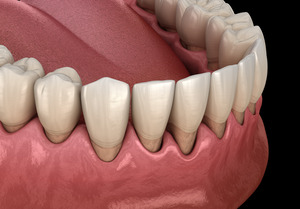
If your teeth seem like they’ve gotten longer, it could be a sign of gum recession. This is when the gums start to move away from the teeth, leaving the roots more visible. If your periodontist doesn’t address the problem quickly, you’ll be at a higher risk for cavities, and you may eventually be in danger of losing your teeth. In order to protect your smile from receding gums, it’s helpful to know what can potentially cause them; here are 5 common reasons.
1. Brushing Too Hard
Brushing harder won’t get your teeth any cleaner. In fact, it could potentially cause serious damage to your smile. Over time, aggressive brushing can gradually erode your gum tissue, resulting in significant gum recession. To protect your gums (as well as your teeth), always be very gentle while cleaning your smile; not a lot of pressure is required to get rid of plaque and leftover food particles. Additionally, make sure that the toothbrush you’re using has soft bristles.
2. Poor Oral Hygiene
Of course, while you don’t want to over-brush, you also want to avoid brushing too little. If you aren’t diligent about brushing and flossing every day, the plaque that builds up in your mouth could eventually lead to gum disease. When left alone, gum disease can cause all kinds of oral health issues, including gum recession. Keep your smile clean and healthy by sticking to a proper oral hygiene routine.
3. Genetics
Anyone can have gum recession, but some people might be more likely to experience it than others due to their genetics. Has anyone in your family suffered from gum problems? If so, you might have a higher-than-average risk for the same kinds of issues. Check your family history to see if you need to take extra care to protect your grin from gum recession.
4. Smoking
Smoking can contribute to gum recession in a couple of different ways. First of all, it weakens the body’s immune system, leaving your mouth more vulnerable to gum disease. Second, it interferes with the healing process, so if the gums become damaged, they’ll have a harder time repairing themselves. If you have a smoking habit, breaking it could go a long way toward protecting your gums.
5. Diabetes
Diabetes can affect your overall health in a variety of ways, and one of the possible consequences it can have is increasing your chances of gum recession. The condition can stop your gums from receiving the nutrients they need to remain healthy. Additionally, diabetes often leads to higher glucose levels in your saliva, which encourages the development of bacteria that can cause gum disease.
Gum recession is not an issue that you can afford to ignore for too long. If you see signs of your gums separating from your teeth, call your periodontist immediately to schedule a consultation and see what steps you can take to bring back the health of your smile.
About the Author
Dr. Zachary Carnow practiced general dentistry for four years alongside his father. Eventually, he decided to pursue further training and went to the Tufts University School of Dental Medicine to study periodontics. Today at Frisco Periodontics and Dental Implants, he is an expert when it comes to gum health. In addition to periodontal therapy for gum disease, he can also perform gum grafts to reverse the damage done by gum recession. To schedule a consultation with Dr. Carnow, visit his website or call (214) 619-4990.
